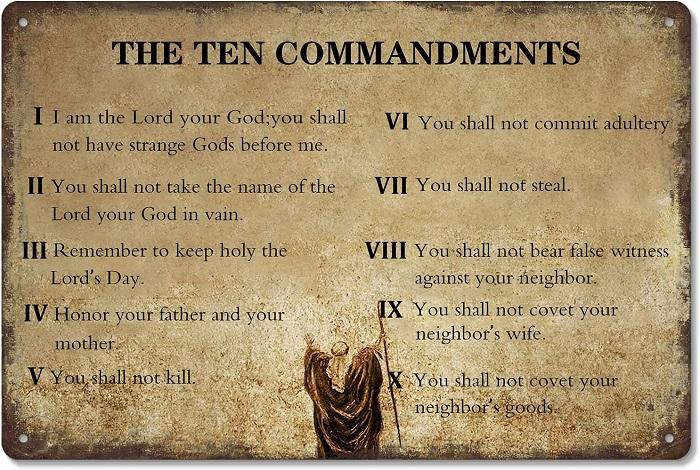Can Societies Function Without the 10 Commandments?

The 10 Commandments are some of the most recognized moral guidelines in human history. They are found in the Book of Exodus and the Book of Deuteronomy. They are often viewed as the foundation of law, ethics, and community life in many cultures. These commandments address how people should relate to God and how people should relate to one another. They cover respect, honesty, faithfulness, and justice.
The question of whether societies can function without the 10 Commandments is complex. It requires us to consider the role of morality, the importance of shared values, and the impact of history. While some societies do not explicitly follow these biblical commands, many of their legal systems and ethical codes are shaped by similar principles. To answer this question, we must explore the history, the influence, and the alternatives.
The Historical Role of the 10 Commandments
The Birth of Law and Order
The 10 Commandments gave Israel a clear code of conduct.
They helped form the identity of a people who were once slaves in Egypt.
They linked morality to divine authority, which gave them great weight.
These commandments became a standard for Western civilization.
Influence on Legal Systems
Many modern laws reflect the spirit of the commandments.
Laws against murder, theft, and false testimony appear in every nation.
Even secular courts rely on principles that resemble biblical commands.
The 10 Commandments provided a model that combined justice with community life.
Morality Without the 10 Commandments
Universal Ethics
Societies outside of biblical tradition also formed moral codes.
Ancient Mesopotamia had Hammurabi’s Code, which set rules for fairness.
Confucianism in China emphasized respect, loyalty, and honesty.
These show that people can create rules without direct reliance on the 10 Commandments.
Natural Conscience
The Bible itself speaks of conscience written on the human heart.
Many cultures share values like respect for parents and prohibitions against violence.
This suggests morality can exist apart from the biblical text.
Yet the 10 Commandments provide a consistent framework that is not easily altered by shifting human opinion.
The Social Impact of the 10 Commandments
Respect for Authority and Community
The command to honor father and mother strengthens family ties.
Respect for family leads to stability in society.
This principle echoes in many cultures, even where the Bible is not central.
Justice and Honesty
The command not to steal protects property and fairness.
The command not to bear false witness preserves truth in courts.
These rules allow societies to build trust among people.
Without them, corruption and deceit weaken social bonds.
Sanctity of Life and Marriage
The command not to kill protects the dignity of life.
The command against adultery preserves marriage and family.
These commands uphold personal responsibility and loyalty.
Societies without these values often struggle with broken families and violence.
Can Societies Truly Function Without Them?
Short-Term Stability
A society may function for a time without direct reference to the 10 Commandments.
Laws and customs can mimic the same values under different names.
Governments can enforce order through power and fear.
Yet such systems often lack moral depth and permanence.
Long-Term Challenges
Without shared values, unity breaks down.
Societies risk becoming driven by personal desire rather than collective good.
Relativism can make morality subjective and unstable.
The 10 Commandments anchor morality in divine authority, offering stability over generations.
Comparisons With Modern Secular Societies
Parallels in Values
Modern democracies promote freedom, justice, and equality.
These values often echo the spirit of the 10 Commandments.
Even when governments remove religious language, the moral framework remains.
Secular societies still punish murder, theft, and perjury, reflecting biblical ethics.
Differences in Foundation
Secular ethics rely on reason, human rights, and social contracts.
These can be strong but are vulnerable to change when public opinion shifts.
The 10 Commandments provide a fixed moral code tied to God’s authority.
This permanence offers a stronger foundation than human agreement alone.
Lessons From History
The Fall of Civilizations
History shows that societies with weak moral codes often collapse.
Corruption, injustice, and violence erode nations from within.
The 10 Commandments address these very issues, offering protection against decline.
Enduring Influence
Even in modern times, the language of the commandments appears in culture, art, and law.
People continue to debate their role because they remain relevant.
Their survival across millennia shows their universal importance.
Conclusion
The 10 Commandments are more than religious rules. They represent a timeless framework for human relationships and social order. While societies can function without explicitly following them, the core values remain necessary for stability. Many cultures have discovered similar truths through their own traditions, but the commandments bring clarity and authority that stand the test of time.
Without the 10 Commandments, societies may build temporary systems of law, but they often lack a lasting foundation. With them, communities gain principles rooted in justice, respect, and responsibility. The enduring question is not whether societies can function without them but whether they can truly flourish without the stability they provide.
- Art
- Causes
- Crafts
- Dance
- Drinks
- Film
- Fitness
- Food
- Juegos
- Gardening
- Health
- Home
- Literature
- Music
- Networking
- Other
- Party
- Religion
- Shopping
- Sports
- Theater
- Wellness



